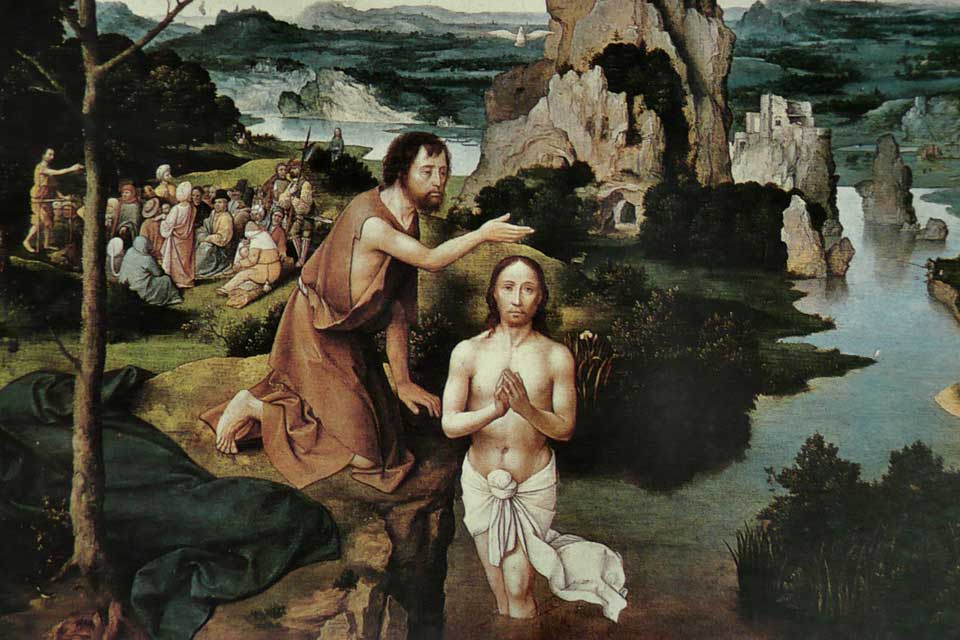Following is the prepared text from Bishop Thomas J. Olmsted’s homily for the Nativity of St. John the Baptist.
June 24, 2018
The Church celebrates the Birth of Jesus with great jubilation every Christmas, but as for all the Saints down through history, she celebrates the birthdays of only two: Mary the Mother of Jesus and John the Baptist.
Notably, the Church also celebrates the martyrdom of John the Baptist on August 29th each year, reminding us that John prepared the way for Jesus not only by his words and deeds but also by his martyrdom. But John’s witness to Christ began even before he was born.
So, the Church around the world today celebrates John’s Birth with great festivity. It is good for us to recall the reasons why.
First, because John’s birth was miraculous and was preparing for a far more miraculous birth soon to follow. Elizabeth was well beyond the age of child-bearing. She and Zechariah, her husband, had deeply desired to have children, but, for some time, had accepted the fact that it would not happen. So, at John’s birth, all her friends and neighbors rejoiced at this miraculous gift. At the same time, they were amazed at the name that Elizabeth gave her child, since none of her or Zechariah’s relatives had been given that name. Then, when they asked Zechariah, her husband, about the baby’s name, they were even more amazed when he wrote on a tablet: “John is his name.” Obviously, God gave this child a special name because he had a special mission. As soon as Zechariah wrote the name, he regained his ability to speak, pointing forward to the day when John’s voice would prepare the way for the Eternal Word made flesh.
The people were so amazed at all this that they said, “Who will this child be? For surely the hand of the Lord was with him.”
What is even more amazing, however, than John’s birth is what happened before he was born. At the moment when Mary came to visit Elizabeth, the infant John leaped for joy in her womb. In this way, he made his mother aware of the presence of Jesus, fulfilling already as an unborn child his mission as the forerunner of Jesus.
The Catechism, in its first paragraph, reminds us: At every time and in every place, God draws near to each person. He never stops seeking us out. Even before a child is born, the Lord comes to him or her, and through him or her to others. This mystery of God’s love can be a great consolation to parents who have suffered the death of an unborn child. While such a loss brings real sorrow, it is consoling to recall how much God accomplished through John before he was born. Our First Reading today proclaims this wondrous mystery when the prophet Isaiah says, “…from my mother’s womb the Lord gave me my name” (Is 49: 1f). Psalm 139 proclaims this same truth of God’s love, “O Lord, truly you have formed my inmost being; you knit me in my mother’s womb. …My soul also you knew full well; nor was my frame unknown to you when I was made in secret, when I was fashioned in the depths of the earth.”
Today’s feast of John’s Birth reminds us of still another fundamental truth of our faith: namely, that He calls all of us not only to follow Him but also to go before Him as His witnesses. John the Baptist carried out this missionary vocation at every moment of his life, beginning in his mother’s womb, throughout his teaching and baptizing at the Jordan, and finally in his courageous martyrdom.
Pope Francis never ceases reminding us that we are not just disciples of Jesus, we are “missionary disciples.” At a papal audience not long after he was elected pope, our Holy Father Francis began his message with these words, “We must always be ready to welcome back the lost sheep.” Then, suddenly, he stopped speaking, shook his head sideways and said, “No, what I just said is wrong. We must not merely be ready to welcome back the lost sheep. We must be eager to go in search of the lost sheep and bring them back to the Flock of Christ.” This is who we are in Christ.
The Apostle Paul wrote, “Not to preach the Gospel would be my undoing.” If he did not desire to hand on the Good News of Jesus to others, then something was wrong.
The neighbors of Elizabeth and Zechariah asked, “What will this child be?” What will you and I be? Will we be who God created us to be, and will we fulfill the mission He made us for? You and I received the great blessing of knowing and loving the Lord Jesus: will we make this evident to others so that they too can rejoice in Him?





